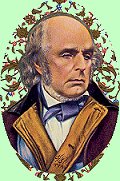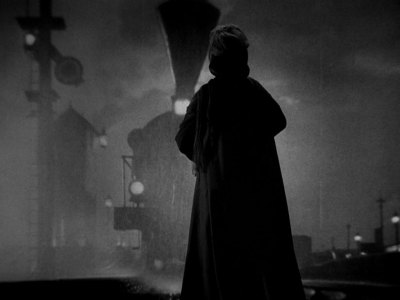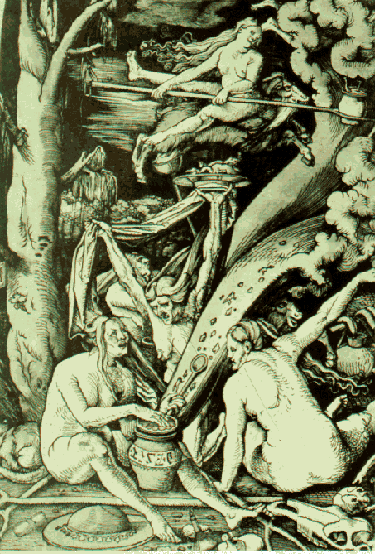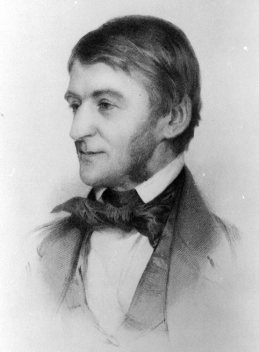
Speaking of ghosts, while I was home last week, lost somewhere between influenza and the next world, I had occasion to put down the ghost stories I was reading and watch a documentary about a place where every house is haunted. I'd seen the listing for this new HBO feature, "
No one Dies at Lily Dale", and intended to watch it straight away, but it had to wait until a gloomy afternoon with the shades down, the curtains drawn, and me in bed in the middle of the day, feverish, shivering, dripping and miserable, sourly bundled in comforters and robes. One must be in the appropriate state of mind sometimes -- undone as it were -- to be open to certain experiences. Peeping at the TV from under the covers, woozy and damply chilled, felt somehow... right.
My curiosity regarding the subject of the film goes back to my early fascination with Houdini, specifically the old Tony Curtis biopic. As a boy, I thought Tony looked lovely in his turn-of-the-century trunks, all padlocked and wet. Harry, as it turned out, was a muscled little cuss himself. My innocent curiosity led me on. (Best not to question this.) While I never became one of those boys with a magic kit and a deck of cards always at the ready, I did become quite interested in Harry Houdini, and read his books, as well as books about him. As a result, I read a good deal about spiritualism too. As an adult, and a skeptic, I've naturally read about Lily Dale as well. Houdini, as the HBO documentary briefly mentions, himself once went there. As the camp's historian describes the incident in the film, Houdini knocked on many doors in Lily Dale, but no one answered.
Perfectly understandable.
At the time Houdini went to Lily Dale, spiritualism was booming. There were a number of communities like Lily Dale, or "camps", as they were called, scattered all across the US, and followers of the movement across the globe, Houdini's great friend, and eventual antagonist, Sir Arthur Conan Doyle, among them. As a professional magician, Houdini's skeptical curiosity about both the claims and methods of the spiritualists proved irresistible, and at the high point in his fame, after the death of his beloved mother, he devoted a fair part of his time offstage to visiting spiritual mediums, attending seances, and talking to both practitioners of the trade and their followers. Eventually, he wrote a number of newspaper articles, and even books, like
A Magician Among the Spirits (1924,) exposing the fraudulent tricks of the mediums. He easily reproduced many of the supposedly supernatural phenomena the mediums used to gull their customers: making "spirit" photographs of himself in conversation with Abraham Lincoln, demonstrating how the mediums used accomplices to gather information for sittings, or to work the darkened rooms, even how some mediums used their feet to manipulate the various crude effects, like the floating "spirit" trumpets, apparitions, "ectoplasm" and the like. By the time Harry Houdini came knocking on the mediums' doors in Lily Dale -- then the grandest and most successful spiritualist tourist camp in the country -- the great illusionist and other skeptics had already dealt what proved to be a near death-blow to the "physical medium." No wonder then they locked their doors and drew the shades when Harry came to call.
Spiritualism, however, did not die, Houdini did. The spiritualist movement, having largely abandoned any attempt at "physical mediumship" beyond the occasional, rather quaint spell of table-rocking and the like -- as briefly and rather awkwardly demonstrated in the HBO film -- survived, as a minor American religious movement. Mediums, now generally describing themselves instead as "psychics," likewise carry on, though nowadays operating almost exclusively as cold readers.
I have some personal experience of this particular phenomenon. In college, in my dormitory, there was a boy, a dancer, who fancied himself a "psychic." The building we lived in was a converted hotel and by the standards of a small, Midwestern city, old. This kid, without meaning any real harm, I'm convinced, managed himself to convince any number of his fellow students that the place was indeed haunted. Harmless fun, for the most part. Various of my fellow theater students began sensing something dark in the corners of their rooms. There was a good deal of shrieking and running down the halls at midnight. The boy-psychic would often be called on to come and "read" someone's room. Invariably, spiritual "disturbances" would be found. Thrilling. Eventually, after much meditative humming and the like, and a brief conversation over candlelight with the ghost or ghosts, the room would be declared "clear," and the entertainment would be over for the night.
One evening in the lobby, I witnessed all of this good natured spookery being taken in a new direction, when a number of kids gathered around this dancer while he did "individual readings." Handing him a ring, or some other personal possession that they normally "kept close" to them, each of the boy's new friends would sit opposite him on the couch, and after a few seconds spent "feeling the vibrations," the consultation would begin in earnest. General astonishment. Amazement. I watched at least three of these readings before requesting my own. I was careful to control myself with a rigid discipline. I confined my answers to monosyllables whenever possible. I intentionally blinked and allowed myself only the smallest movements only when I was quite sure to be unobserved by the boy during the reading. I even smiled at inappropriate moments, before rejecting his conclusions, though always in a seemingly encouraging way. My reading was his first complete failure. General Astonishment. Disbelief. Then I read him. And then I did another. And then I told them what I'd done.
It was exhilarating, and more than a little cruel. I don't say that either of us was specially expert, or that my understanding of doing this trick was specially sophisticated. What I counted on, as all amateur practitioners of the technique must, was mostly the willingness of my sitters and audience to overlook and promptly forget all the guesses I'd got wrong, all the vague questions and not very specific predictions, the broad conclusions from the small details I'd been told and that the sitters invariably then forgot having mentioned. To "read" someone in this unscientific, spiritually unsophisticated way, really only requires patience, a little practice, concentration, particularly on any change in the sitter's expression or posture, and most importantly, a willingness, or rather a genuine eagerness on the part of the sitter to
believe. I don't doubt even now that that kid who fancied himself a psychic was completely sincere. Maybe he was extraordinary, in some way, you know, just not the way he thought. (I'd still love to meet a genuine psychic myself.) He had never questioned, so far as I was ever able to tell, but that what he was doing was making some mystical connection with his sitters and or the spiritual realm. What I did, he eventually explained, despite my own explanation of the cold readings we'd both done that night,
must somehow have been influenced by some malevolent "presence," presumably beyond whatever malevolence I was exhibiting myself. When he retired from the field, I actually felt kinda bad. I made no friends among his followers either, though a few of my friends who had actively participated in all this did seem a little shamefaced that night. I don't think the dancer did any more readings in the dorm thereafter, at least not in public, to my knowledge.
Some part of me then, despite my own experience, despite my own reading on the subject, watching "No One Dies in Lily Dale," rather hoped to have the little hair I have left on the top of my head be made to stand up at some point by something like the inexplicable. As I've said, I was feeling a special connection that day to the dead.
What I saw though was a melancholy business. Today, Lily Dale, rather than the thriving resort it was before Houdini's day, is a shadow of its former self, just a quaint little village in upstate New York, seemingly populated entirely by mostly well meaning souls who make their obviously rather modest living by charging admission to the camp, renting rooms to the sparse crowds of summer visitors, and performing a few shows a day at the stump, when they aren't holding private consultations at picnic tables or in their parlors. It was all just so very... sad.

The famous stump, now fenced, was the spot in the woods where once the spiritualists held their high hootenannies with believers in their hundreds. Onto this natural Chautauqua platform would rise one of the leaders of the movement, and from that perch would come all manner of revelation, presumably. Now, prognostications are confined to the ground, where the hardworking "Miracle Mongers," to use Houdini's cruel phrase, must mingle with their meager audiences like performers in a rather musty night-club act; calling out ailments, etc., like diabetes, until they get a nod from the fat lady, or rather until they pick one of the nodding fat ladies to diagnose in this way.
The film concentrates on roughly half a dozen of the locals, mostly ladies of a certain age, as they work the little crowds or practice on their porches. The personal interviews with nearly all these folks are quite sweet. One never gets the sense, even from the most hopelessly inept of these "certified" practitioners but that they, like the dancer in my dorm, are utterly sincere. Even the gentleman who cures illness by holding a green pepper near people, seems touchingly proud to have "helped." Another fellow, an impatient, almost brusque little bald chap, while by far the least likable and least successful of those offering private readings, seems not so much smug as sad when the camera finds him left to console himself on the stoop, without receiving so much as a thank you from his client, though presumably she paid up-front. He tells us that not everyone is ready to hear what he has to say. He then offers a wan, rather toothy smile. This, after he's got things quite wrong, even as to the voice and vocabulary of the deceased, obviously relying on a rather unsophisticated template of a generic male and in so doing producing a specially disastrous failure with a young woman seeking a message from the fiancee who may or may not have done himself a deadly harm before they could come to get married. The client angrily tells her friends as they walk away, that the guy was obviously "a fraud."
I don't know that that was a fair statement. Of all the Lily Dale residents one meets in the film, he did seem the least enthusiastic performer, but I at least never had the sense, even from him, that he thought for a minute that what he was doing was put on, or that he, or any of them, gave the slightest suggestion of obvious fakery or attempted tricks of any kind. Even the brassy chick from Vegas, making her first guest appearance at the stump, hilariously hobbled in the gravel by her stripper-heels, proves to be a surprisingly sincere, even vulnerable individual under all the makeup and false tits and hair. When we see her later in private consultation with a resident operator, to whom she confesses her confusion about what to do with her ne'er-do-well adult son, even the Vegas gal seems strangely without personal resources, and willing, grateful in fact, to take in the blandest greeting-card-wisdom as one thirsting in the desert.
For the most part though, everyone living in Lily Dale seems jolly enough. One woman, in an unguarded moment, does admit to the occasional conflict in the community, though a second later, she's quick to reassert something more like universal harmony as the general rule. In my favorite scene in the film, this lady and her two sisters, village psychics all, join a small gathering of savants for what would once have been called a seance. Circling the dining room table, heads bowed in the fading summer light, this might almost be a Quaker meeting; the silence slowly punctuated with murmured prayer. Then the other guests are announced. One by one, various invisible visitors are noted as present. The roll-call is surprisingly extensive in the small dining room. One wonders if various dead relatives might be on the porch impatiently waiting their turn.
"I'm getting a David," one lady says, "but not
your David," she adds helpfully, referring to another lady's deceased husband. "Though, your David's here," a third lady is quick to assure the widow. "Yes, I
know," the widow rather irritably acknowledges, clearly not needing to be informed as to her late husband's whereabouts by some helpful third party.
Were the spiritualist activities in the town confined to just this sort of harmless after dinner demonstration, the daily recreations in the woods and the services in the clapboard meeting hall, the decision of the documentarians to treat the whole enterprise as a ever so slightly risible exercise in religious Americana would be understandable. These folks are Constitutionally entitled to rock tables, talk to the dead and see angels in the hedges. But Lily Dale, remember, is not just some New Age retirement settlement, but a business, or, as one visitor calls it, a kind of "spiritual Disneyland." (Though, from the look of the place, it might be better to think of Lily Dale as a kind of Colonial Williamsburg of Spiritualism; a minor historical site preserved from more prosperous days, where instead of churning butter, they churn the dead.) Beyond the entrance fees and the hotel rooms and the price of rock crystals in the gift shops, Lily Dale is a working psychic mill. Though money is never seen to change hands in the film, everyone in for the day or the week for consultations with the unseen, pays for the privilege. The grandmotherly lady with the fluttering eyelids presumably doesn't invite passersby into her pink living room without collecting admission. Some of these old birds even have their rates helpfully posted at the door.
The film's director, Steven Cantor, never saw a pseudo-religious lawn ornament, or even a lawn-gnome, he didn't choose to photograph in the dewy light of dawn, or a music-box-angel that didn't deserve a close-up. Cantor's recurring emphasis on this ubiquitous kitsch in Lily Dale is as close as he comes to commenting directly on the vacuity of the spiritualists' theology, at least as touched on in the film. Only a brief scene of Christian fanatics protesting witchcraft at the gates of Lily Dale, suggests that there is an alternative view of all the relentless sunshine and sugar-water being served inside. In the psychic readings, public and private, into which Cantor inserts his camera, the filmmaker maintains an almost cinéma vérité neutrality. The clients are interviewed before and after, and allowed to comment without prejudice. The only negative review of these readings comes from the one dissatisfied customer I mentioned above. She is encouraged, by her friends, and then by the one -- resident -- expert in these matters, an in-house historian of the movement who smilingly acknowledges the possibility of just such an empty experience as that which she'd had with the toothy little bald guy, nevertheless she is encouraged to have another go. When she does, she doesn't so much endorse the second reading as satisfactory, so much as less unpleasant. In her final scene in the film, what she seems finally to come away with from the experience is the same conclusion about the need to "move on" with which she came to Lily Dale. So, did this woman have some spiritual connection to her dead fiancee at Lily Dale? Far be it from Cantor to be so unsympathetic as to intrude further on her grief by asking directly.
In maintaining something like the appearance at least of journalistic neutrality then, Cantor is free to return to his wind-chimes and sweeping, overhead shots, so suggestive of souls in free flight. Steve Cantor can't seem to help himself, whatever the evidence of human misery he's recorded on the ground, from finding Lily Dale charming. But this isn't journalism, of course. While such a dusty little operation as Lily Dale may admittedly not deserve anything like an expose, neither does it deserve this reverent silence as to the veracity of it's claims to spiritual comfort, or it's history as the summer quarters of this antique sideshow still called spiritualism. Cantor, in choosing to not explore the history of the place, or question either the residents or their paying clients too far as to the substance or even the palliative efficacy of these "readings," or the tragic circumstances that brought these paying visitors to Lily Dale, ends by endorsing the experience as unique. In not providing the viewing audience with any perspective antithetical to either the shallow optimism of the spiritualist "theology," other than a few ranting fundamentalists at the gate, or any explanation of the thoroughly shoddy methods employed in the readings, the filmmaker frees himself to remain utterly credulous as to the psychics' claims, and indulge his taste for pretty aerial pictures, while condescending without much subtlety to the sad people who've come in search of consolation, and the resident believers in auras, angels, and universal love.
That is the film's failure. My own disappointment in not seeing anything supernatural happen at Lily Dale isn't unexpected, but I was frankly shocked to watch a documentarian with a connection to HBO -- perhaps the most influential, and certainly the most economically powerful support of the form in the US today -- produce such an insubstantial exploitation of American spiritual naivete. Glancing mockery of the taste or mental stability of the participants aside, what Cantor's film ultimately comes to is a valentine to a persistent, and more than a little pernicious, failure of contemporary American society to deal honestly with either the immutable nature of grief or the inscrutability of death. We do not like, in this country, to be seen to have failed at anything; medicine, parenting, love, life, or even the persistence of personality after death. It goes against the grain to admit the end of anything so ruggedly individual as us. So, buck up, people! It's all good. Even death can be an opportunity. Spiritualism then, as seen in Cantor's puff, is but the natural reductio ad absurdum of this insistent, sunny economic optimism that has already proved that it can kneed traditional Christianity into such a doughy mixture that it easily accommodates greed and pride, yoga and animism. Commercial spiritualism, at least as seen sincerely practiced in Lily Dale, in Cantor's film, comes from the same benign capitalist impulse that make saints into Santa Claus for Coca Cola, and Milton's angels into hummel figurines. Death then is just another stage in our personal growth. Seems silly the to get so worked up about it, doesn't it?
Where's the harm in Lily Dale, then?
Well, there isn't, much. No one goes there but in search of what's on offer, even, evidently, Steve Cantor and HBO. No one is getting rich in Lily Dale. No one is telling lies, even the filmmaker, except maybe to themselves. That I was hoping for something a little more enlightening, or at least harrowing, let's blame on my cold. Takes a lot to make me optimistic about immortality when I'm shivering with a fever and can't taste anything but salt.
 This visit home is, or rather was, something of a working vacation, at least for the first couple of days. What this meant was flying into Pittsburgh -- after ridiculous if entirely predictable delays with my connection through Atlanta -- and then staying for a day or two in McKeesport, PA to shop a remainder warehouse for the bookstore where I work. (Anyone who has been in the books business as long as I have, and is still at it, will have come to appreciate the value of discounted books, and publishers' discontinued -- or remaindered -- titles in particular. Once just the stuff of discreetly labeled bargain tables, remainders now are or ought to be a considerable part of what a successful bookstore sells. Not sure how anyone keeps the doors open nowadays without them.) To be honest, I haven't bought remainders for a bookstore in a very long time. My concentration for years now has been used books, all but exclusively. But, as I was coming back to Pennsylvania anyway for a little family time, and as this time I was traveling alone, it seemed an admirable idea that I stop in McKeesport first and do a little business before heading North to my folks house.
This visit home is, or rather was, something of a working vacation, at least for the first couple of days. What this meant was flying into Pittsburgh -- after ridiculous if entirely predictable delays with my connection through Atlanta -- and then staying for a day or two in McKeesport, PA to shop a remainder warehouse for the bookstore where I work. (Anyone who has been in the books business as long as I have, and is still at it, will have come to appreciate the value of discounted books, and publishers' discontinued -- or remaindered -- titles in particular. Once just the stuff of discreetly labeled bargain tables, remainders now are or ought to be a considerable part of what a successful bookstore sells. Not sure how anyone keeps the doors open nowadays without them.) To be honest, I haven't bought remainders for a bookstore in a very long time. My concentration for years now has been used books, all but exclusively. But, as I was coming back to Pennsylvania anyway for a little family time, and as this time I was traveling alone, it seemed an admirable idea that I stop in McKeesport first and do a little business before heading North to my folks house.













































